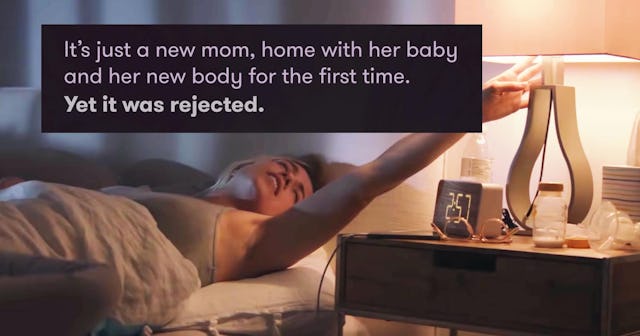Frida Mom Ad Rejected From Oscars For Showing The Truth About Postpartum Recovery

An ad for Frida Mom was rejected from the Oscars for showing the graphic reality of postpartum mom life
Take a survey of women who have given birth and chances are good that the majority will say the recovery process was a lot tougher (and grosser) than they anticipated. Why? Probably because our society doesn’t really discuss the graphic details about those first days after having a baby including the painstaking process of using the bathroom while your nether regions are still in serious pain. Postpartum product company Frida Mom is trying to do exactly that with an ad showing the truth about postpartum recovery — and the Oscars rejected it.
Yup. Apparently the process of recovering from giving birth is too much for the Oscars but Frida Mom is still sharing it on their own channel. They write, “The ad you’re about to watch was rejected by ABC & the Oscars from airing during this year’s award show. It’s not ‘violent, political’ or sexual in nature. Our ad is not ‘religious or lewd’ and does not portray ‘guns or ammunition’. ‘Feminine hygiene & hemorrhoid relief’ are also banned subjects. It’s just a new mom, home with her baby and her new body for the first time. Yet it was rejected. And we wonder why new moms feel unprepared.”
The commercial shows a very recently post-birth momma waking to her infant’s cries, but before she can attend to the little one, she needs to use the bathroom — a process that isn’t exactly simple during those first days. She gingerly walks to the toilet and begins the familiar ritual of changing her pad, using that magical spray bottle, laying down hemorrhoid pads, and finally releasing her pee while breathing her way through the pain.
Is it pretty? Nope. It’s gross. But that’s postpartum life. If someone were to criticize the commercial, they might say something like, “Well I don’t want to see someone using the toilet for any reason!” Well Karen, thing is, everybody poops. Literally. It’s not something we need to normalize or discuss to remove the stigma because unless you’re a scared public pooper *raises hand* it’s pretty widely accepted and everyone knows how it goes.
But those first days at home with a new baby? Odds are most new moms have no idea the freight train of pain, blood, exhaustion, and weird stuff in the toilet that’s about to hit them. I’m what I’d consider a pretty open person and there’s not much I avoid discussing. Whether it’s on purpose or not, I can hardly recall telling any of my friends what my first days postpartum were like when it came to physical recovery. If we aren’t talking about it, it’s easy to see why those first days can come as a shock to new moms.
Enter Frida Mom’s attempt at capturing the reality of postpartum life — and boy, did they nail it.
Frida Mom founder and CEO Chelsea Hirschhorn tells Scary Mommy they have no plans to appeal the decision by the Oscars to not run the ad. “We were just trying to highlight the raw realties of what millions of women in the US experience every year. That said, we will continue to find ways reach the broadest audience and prepare as many women as possible about what to really expect when expecting.” The company just wants moms to know what they’re up against once pregnancy ends and the “fourth trimester” begins. “It continues to amaze us how many women go into child birth without a true understanding of what their bodies are about to endure and what they really need to recover,” Hirschhorn says.
We still see blue liquid dripping onto menstrual pads during commercials for those products instead of something even remotely resembling blood, so it’s not terribly shocking that an ad showing the truth about recovering from birth was rejected. But until we normalize this conversation, the reality of it will continue to be censored — and moms will continue to be stunned by the difficulties they’ll face in the days after having a baby.
This article was originally published on